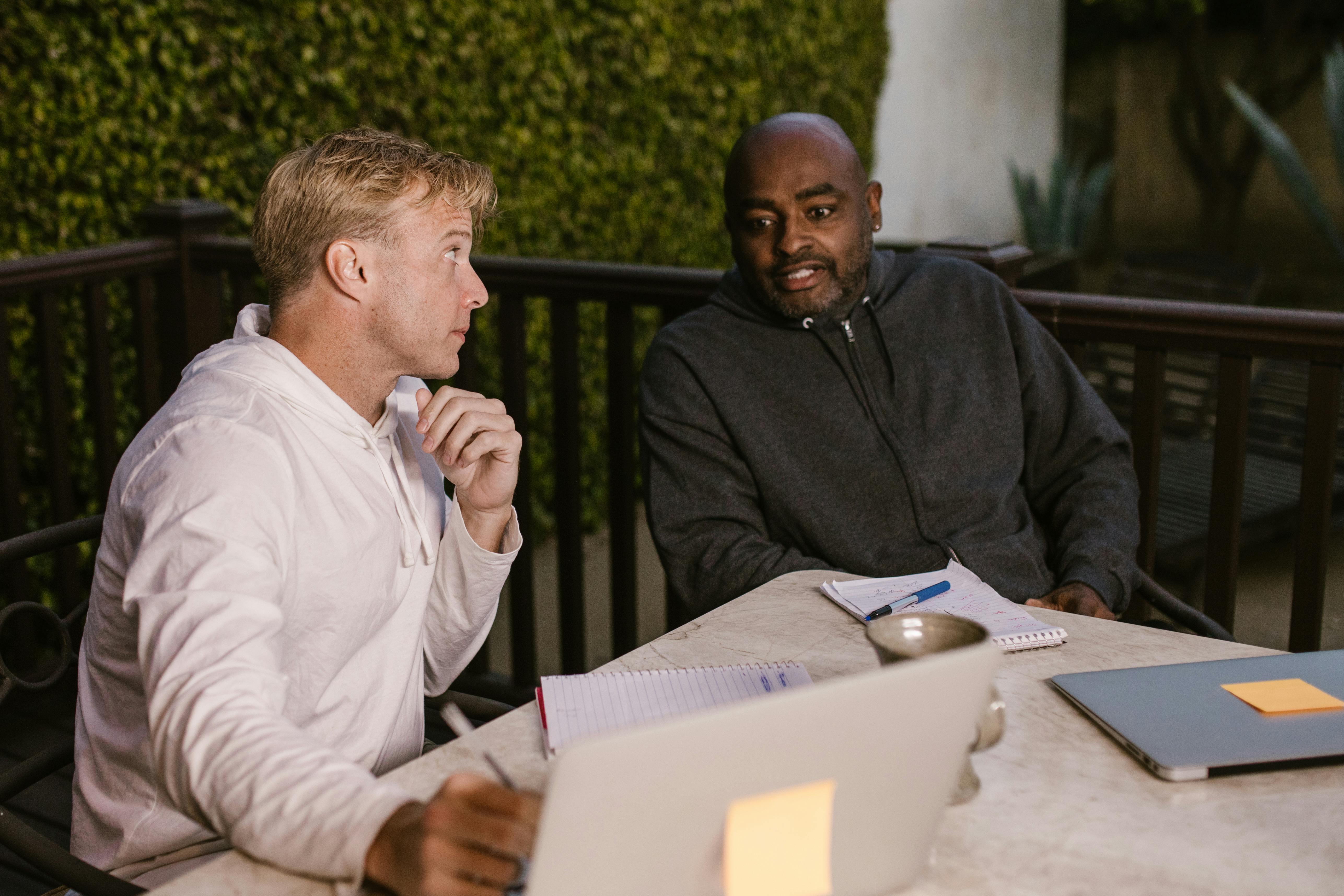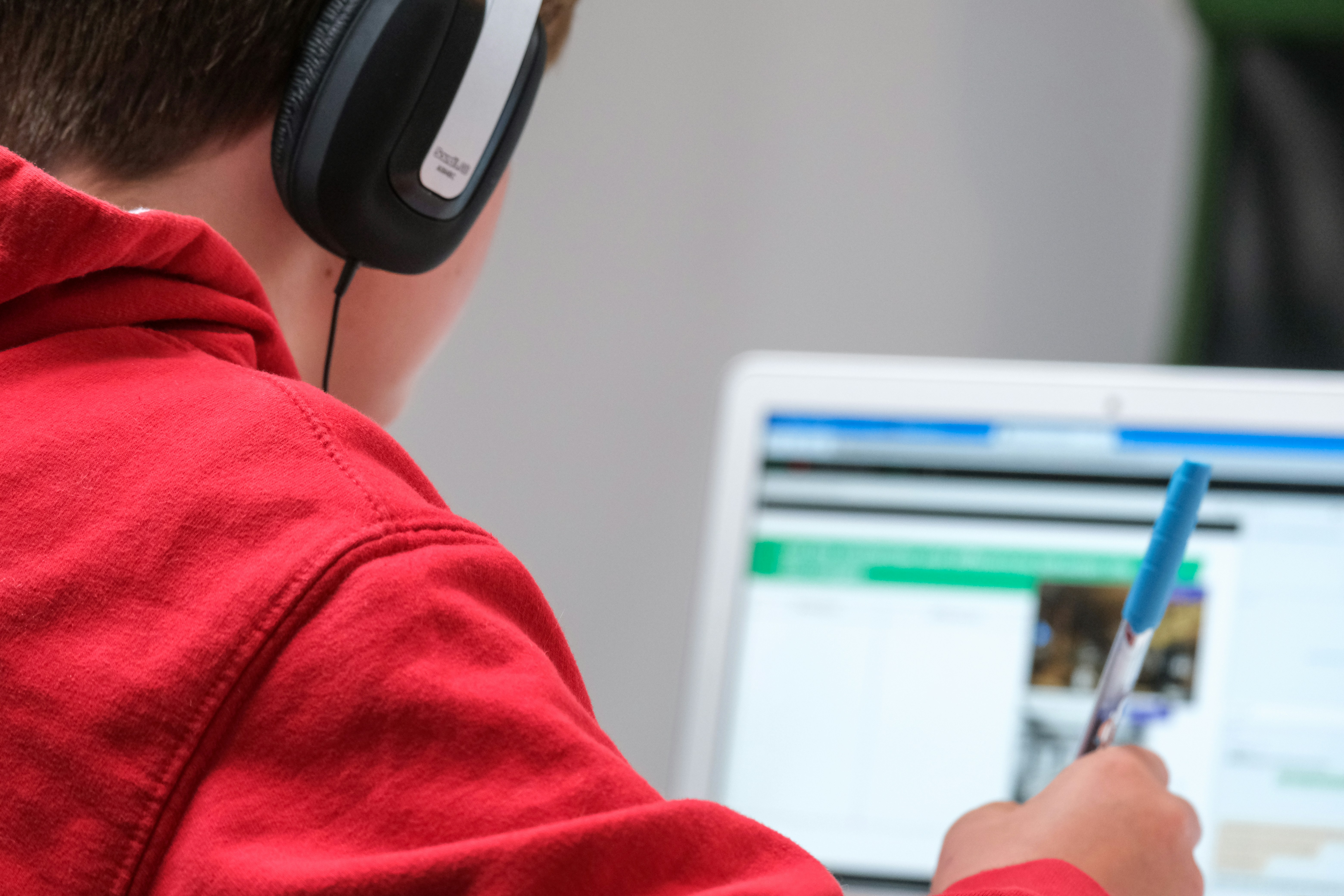
Unlocking Potential: The Power of One-on-One SEN Mentoring
One-on-one mentoring can truly be a game-changer for kids with Special Educational Needs (SEN). As an SEN Manny Mentor, I’ve seen firsthand how personalized attention can completely transform a child’s academic performance, social confidence, and emotional well-being. In this blog, I’ll share why I believe one-on-one mentoring is so powerful, some of my favorite success stories, and why this isn’t just about learning - it’s about unlocking potential...
One-on-one mentoring can truly be a game-changer for kids with Special Educational Needs (SEN). As an SEN Manny Mentor, I’ve seen firsthand how personalized attention can completely transform a child’s academic performance, social confidence, and emotional well-being. In this blog, I’ll share why I believe one-on-one mentoring is so powerful, some of my favorite success stories, and why this isn’t just about learning - it’s about unlocking potential.
The Power of Individualized Attention
Let’s be honest - traditional classrooms can be tough for SEN kids. There’s so much going on, and it’s hard for teachers to give every child the personalized support they need. That’s why one-on-one mentoring is so special. It gives me the chance to focus completely on your child, adapting to their unique learning style, pace, and needs.
- Tailored Learning Strategies: Every child learns in their own unique way, and with SEN kids, it's especially important to adapt to their individual needs. In a one-on-one setting, I can quickly figure out what works best for your child. Maybe they need tasks broken down into smaller steps, or maybe visual aids or movement work better for them. Whatever it is, I make sure the learning is fun and engaging.
- Building Trust and Connection: For me, it’s all about building a real connection with your child. I’m not just a teacher; I’m someone who’s in their corner, cheering them on. Kids can sense when you genuinely care, and that trust is the foundation for everything. When they feel safe, supported, and seen, that’s when they really start to thrive.
- Consistent Feedback and Encouragement: I’m there every step of the way to offer real-time feedback and encouragement. Whether it’s celebrating a win or working through something tricky, I make sure your child feels supported and motivated. Building self-esteem is a big part of this, and I make sure they know just how capable they are.
Addressing Academic, Social, and Emotional Needs
My approach isn’t just about academics - it’s about helping your child thrive in all areas of life.
- Academic Growth: At Colfe’s School, I worked with a brilliant student who had autism, ADHD, and dyslexia. We didn’t just focus on textbooks; we found ways to make learning fun and meaningful. My background as an SEN PE teacher really helped me keep things dynamic, and when kids are engaged, they start to see that learning can be something they enjoy. It’s amazing to watch that shift happen.
- Social Confidence: Social skills can be tricky for SEN kids, and I’ve found that role-play, games, and real-world practice can really help them feel more comfortable. In our sessions, we work on making social interactions less stressful and more fun. We laugh, we learn, and slowly but surely, they build the confidence to navigate social situations with ease.
- Emotional Well-being: Life can be overwhelming, especially for kids with SEN. Anxiety, low self-esteem, and handling change can feel like huge obstacles. In our one-on-one sessions, I create a safe space for your child to express their feelings and develop coping strategies. Together, we work on building resilience and fostering a positive self-image - because every child deserves to feel good about who they are.
Success Stories: Real-Life Transformations
Watching kids overcome their challenges and grow into themselves is one of the best parts of what I do. Here are a few stories that always inspire me:
- The boy who hated PE: I once worked with a student with ADHD who absolutely dreaded PE. He wouldn’t participate at all. By the end of the year, he was not only taking part - he was leading teams and told me he wanted to be a PE teacher! Watching him transform from someone who avoided the field to someone who owned it was incredible.
- The shy girl who became a leader: I also had the privilege of mentoring a girl with social anxiety. She started out too shy to join group activities, but through our sessions and her involvement in my drama club, she blossomed. She ended up leading the club, joining the school council, and performing in front of her peers. It was amazing to see her confidence grow.
- The boy who found his voice through reading: Another student, a boy with dyslexia, once felt defeated by reading. We introduced multisensory learning techniques, and slowly, he began to see reading as something he could conquer. His confidence didn’t just improve in school - it improved in every part of his life. He started seeing himself as capable, and that shift was incredible to witness.
Why Parents Should Consider One-on-One Mentoring
I know that navigating the world of SEN can be overwhelming as a parent. One-on-one mentoring isn’t just about academics - it’s about supporting your child’s growth in a deeply personal and meaningful way.
- Empowering Children: My goal is to help kids discover their strengths and feel confident in their abilities. It’s not just about getting better grades - it’s about helping them feel like superheroes in their own story.
- Consistency and Commitment: I work closely with you, your child, and their therapists or teachers to create a cohesive plan for success. I’m there consistently for your child, providing the stability and support they need to thrive. When a child feels supported by a team, that’s when the real magic happens.
Conclusion
One-on-one mentoring is so much more than just tutoring - it’s about helping your child unlock their full potential. Through tailored support, real connection, and plenty of positive reinforcement, I’ve seen kids make incredible transformations. If you’re looking for someone who’s committed to helping your child grow, learn, and succeed, I’d love to be a part of their journey. Together, we can turn challenges into triumphs and help your child shine.

Building Confidence in SEN Kids: How to Help Your Child Believe in Themselves
Confidence - it’s that magic ingredient that turns “I can’t” into “Watch me do this!” As someone who’s spent years helping kids find their voice, I’ve seen just how transformative a little self-belief can be. Now, as an SEN Manny Mentor, I get to help kids discover their inner superheroes every day. Let’s dive into why confidence is a game-changer for SEN kids and how we can help your child see the amazing person they truly are...
Confidence - it’s that magic ingredient that turns “I can’t” into “Watch me do this!” As someone who’s spent years helping kids find their voice, I’ve seen just how transformative a little self-belief can be. Now, as an SEN Manny Mentor, I get to help kids discover their inner superheroes every day. Let’s dive into why confidence is a game-changer for SEN kids and how we can help your child see the amazing person they truly are.
The Confidence Conundrum: From Shy Kid to Self-Believer
Let’s get real: I used to be a shy kid. Yep, the irony isn’t lost on me - I’m now the guy helping kids boost their confidence. Growing up in an all-boys school meant I was pretty clueless when it came to talking to girls (acting saved me on that one). But here’s the thing: confidence isn’t something you’re just born with. It’s built, step by step, like leveling up in a game. And for kids with SEN, who often feel like they’re battling the world on hard mode, confidence can seem like a hidden level they’ll never reach.
That’s where my job comes in: I believe every kid has superpowers - unique talents, quirks, and strengths that make them who they are. My role? To help them find those superpowers, own them, and use them like a secret weapon. Because once they start believing in themselves, it’s game over for self-doubt.
Drama Club and the Art of Being Unapologetically You
I’ve run drama clubs at places like Bell House, where I’ve seen drama games turn shy kids into stage-loving, self-confident leaders. Drama is powerful because it’s all about taking up space, using your voice, and embracing every part of yourself - quirks and all. It’s about stepping into a role and realizing, “Hey, maybe I’ve got this.” Drama doesn’t just build acting skills; it builds life skills.
The Philosophy of Who You Are: Embrace Your Superpowers & Individuality
One of my favorite parts of mentoring is diving into the philosophy of who you are. Every kid I work with is like a rare gem - unique, a little rough around the edges, but shining with potential. We all have different needs, wants, and strengths - our superpowers. My job is to help kids recognize those superpowers, embrace them, and love themselves without apologies. It’s about showing them that who they are is enough. Once they get that, it’s like handing them the ultimate confidence boost.
- Activity Alert: One of my go-to activities? 2 Truths and 1 Lie. It’s simple, fun, and super effective. It’s all about embracing the weird quirks and interesting facts that make us who we are. The best part? Watching the kids’ reactions when they find out I’ve never tasted pizza - they’re always ready to kick me out! But hey, I embrace it, quirks and all. And that’s what I want them to do - own every part of who they are, even the unexpected.
Confidence Isn’t About Perfection - It’s About Showing Up
One of the biggest lessons I teach is that confidence isn’t about being perfect. It’s about showing up, trying your best, and not sweating the small stuff. In my drama sessions, we mess up on purpose - silly faces, funny accents, and all. It’s fun, and it’s a sneaky way to teach kids that mistakes are just part of the process.
Confidence grows when kids learn to laugh at themselves and keep going, no matter what. It’s not about being the best - it’s about being brave enough to try.
Success Stories: Real-Life Transformations
One of the best parts of my job? Watching kids turn their struggles into triumphs. Here’s one of my favorite wins:
- The Boy Who Couldn’t Raise His Hand: Then there was a boy who struggled with such low confidence that he couldn’t even raise his hand to ask for help in class - he didn’t want anyone to hear him or see him. During our one-to-one sessions, I’d share stories about my own journey from shy kid to confident mentor. I spent time showing him his superpowers and what his unique brain was capable of. We played games that encouraged him to be loud, scream, and use his voice. Before you knew it, he was helping classmates who were struggling, joining the UNO & Chess Club at lunch, and playing almost every week with students and teachers. Seeing him go from silent to confident was like witnessing a total transformation.
How You Can Help Your Child Build Confidence
As parents, you’re the real MVPs in your kid’s confidence journey. Here are some things you can try at home:
- Celebrate the Small Wins: Confidence builds step by step, so celebrate every victory - big or small. Tried something new? Win. Spoke up in class? Win. These moments matter.
- Encourage Self-Expression: Let your child express themselves in whatever way feels right - drawing, acting, singing, whatever. It’s all about finding their voice and owning it.
- Model Self-Confidence: Show them what it looks like to be kind to yourself. Laugh at your mistakes, own your quirks, and don’t be afraid to be yourself. They’ll learn more from watching you than you think.
Conclusion: Confidence is the Ultimate Superpower
Building confidence isn’t a one-off - it’s a lifelong adventure. As an SEN Manny Mentor, I’m here to be your child’s guide, cheerleader, and biggest fan. My mission? To help them see the beauty in who they are, embrace their quirks, and live their lives without caring what anyone else thinks. Because when kids start believing in themselves, there’s no limit to what they can do. Let’s team up and help your child step into their power, one awesome moment at a time.

Bridging the Gap: How a Young Mentor Connects with SEN Kids on Their Level
As a Gen Z SEN Manny Mentor, I’m right in the mix of TikTok trends, memes, and gaming. I get the slang, the humor, and the world kids live in today. It’s more than just knowing what’s cool; it’s about using that to build real connections with the kids I mentor...
As a Gen Z SEN Manny Mentor, I’m right in the mix of TikTok trends, memes, and gaming. I get the slang, the humor, and the world kids live in today. It’s more than just knowing what’s cool; it’s about using that to build real connections with the kids I mentor.
Gen Z Energy: Bringing the Hype to Mentoring
I’ve got energy to burn - seriously, I was the hyperactive kid, and now I’m the hyperactive mentor. I once clocked over 35,000 steps in a day with a boy who loved running around, and I was all in. Kids feel seen when they meet someone who matches their energy and isn’t fazed by their need to move, explore, and just be themselves.
Gaming, Slang, and Memes: Speaking Their Language
I’m not just a mentor; I’m in their world. I chat about gaming, laugh at their memes, and get their jokes. During my time at Centre Academy, I’d be outside at lunch, playing football, hosting tournaments, and just hanging out. I wasn’t a distant adult - I was right there, competing, bantering, and understanding their way of communicating.
Connecting Beyond the Hype: For Kids Who Need More Than Just Movement
Not every child is bouncing off the walls. Some kids just need someone who listens, who gets it, and who’s there when things feel heavy. At Centre Academy School, the incredible headteacher, Kas Lee Douglas, saw that I was more than just the SEN PE Teacher or Coach. She trusted me to take on PSHE lessons and something special called “Costa Couch” - a cozy one-on-one space where kids could talk, vent, and just be heard. It wasn’t about running around; it was about sitting down, listening, and giving kids the emotional support and guidance they craved.
Building Trust Through Relatability
At 27, I’m young enough to get where these kids are coming from. I remember what it’s like to be figuring things out, and that relatability builds trust. Kids don’t just see me as a mentor; they see someone who gets their world, their challenges, and their wins. It’s not about being in charge - it’s about being there with them, whether that’s on the field or on the couch.
Embracing the Chaos and the Calm with Empathy
I don’t just handle hyperactivity; I embrace it. But I also know how to meet the quieter kids who just need someone on their level. Whether it’s running, playing, talking, or just sitting quietly, I’m in my element. I understand that every kid is different, and I’m all about connecting in whatever way works best for them.
Conclusion: Relatability is the Key to Connection
Being a young mentor is about more than keeping up - it’s about truly connecting. My energy, relatability, and understanding of the Gen Z world help me bridge the gap and form genuine bonds with SEN kids, whether they’re hyperactive or just looking for someone to talk to. If you’re looking for someone who gets your child’s world and knows how to connect, let’s team up. Because when kids feel understood, they thrive.
Read More

From Classroom to Home: Integrating Therapies for Comprehensive SEN Support
Supporting children with SEN isn’t just about school or therapy - it’s about creating a seamless connection between learning, home life, and therapeutic support. I’ve seen firsthand how a holistic approach can transform lives, especially with my home school client, where education, life skills, and outdoor/indoor fun all come together in a way that feels natural and connected...
Supporting children with SEN isn’t just about school or therapy - it’s about creating a seamless connection between learning, home life, and therapeutic support. I’ve seen firsthand how a holistic approach can transform lives, especially with my home school client, where education, life skills, and outdoor/indoor fun all come together in a way that feels natural and connected.
Holistic Approach: Learning Beyond the Classroom
For the past two years, I’ve worked closely with occupational therapists, speech and language therapists, and educational therapists - thanks to incredible support from the local authority. My job? To ensure all aspects of a child’s development are aligned. From nature walks and role play to video games and conversations, every session is about more than just academics; it’s about meeting the child where they are and making learning meaningful.
My homeschool client absolutely loves gaming - it’s his safe space. To connect, I play games with him, talk about everything under the sun, and even dove into anime, something I’d never watched before! It’s all about meeting them in their world, embracing what they love, and building trust from there.
Teamwork: Aligning Therapies for Maximum Impact
I’m not just coordinating therapy sessions; I’m bridging the gap between them. Working side by side with therapists, I ensure that what happens in a session doesn’t stay there - it flows into our daily activities. If speech therapy focuses on communication, we practice those skills everywhere, from chatting during gaming to cooking in the kitchen. It’s about creating continuity so every step forward feels natural.
My Role: The Central Connector
Think of me as the captain of a very important team, steering everyone in the right direction. I keep everything running smoothly, ensuring progress isn’t just seen in one area but across the board. This approach doesn’t just boost academics; it enhances the child’s overall well-being, making them feel secure, confident, and ready to tackle the world.
Why Integration Matters: Creating a Cohesive Support System
A holistic approach means we’re not just focusing on one piece; we’re connecting the whole puzzle. It’s not about quick fixes but about building long-term, meaningful progress that touches every part of a child’s life. By integrating therapies with home and education, we create a support network that’s strong, aligned, and all about helping your child thrive.
Conclusion: Making It All Work Together
Bringing education, therapy, and home life together creates a powerful, unified approach that truly supports SEN kids. As someone coordinating every piece of the puzzle, I’ve seen how this comprehensive support makes a world of difference. It’s more than just a session - it’s about celebrating every step forward and building a cohesive, supportive environment that helps your child shine.
Read More

Managing PDA (Pathological Demand Avoidance): Strategies That Work at School and Home
Navigating Pathological Demand Avoidance (PDA) can feel like trying to catch smoke - tricky, unpredictable, and never straightforward. But with creativity, patience, and a sprinkle of fun, we can turn resistance into small victories. Here are my tried-and-true strategies for managing PDA, both at home and in school...
Navigating Pathological Demand Avoidance (PDA) can feel like trying to catch smoke - tricky, unpredictable, and never straightforward. But with creativity, patience, and a sprinkle of fun, we can turn resistance into small victories. Here are my tried-and-true strategies for managing PDA, both at home and in school.
1. Make It Spontaneous: Disguising Demands as Adventures
With PDA, it’s all about framing. Make tasks feel spontaneous, like an impromptu adventure rather than a to-do list item. It’s not “We need to go for a walk”; it’s “Let’s explore this secret park I’ve heard about.” The goal is to make it feel like an exciting journey, not another chore.
2. Find What They Love and Merge It with the Task
To connect with kids, find what they love and weave it into the activity. If they’re into helping people, tap into that. If they’re all about dogs, anime, or skateboards, use it. For a child obsessed with anime, I’ve framed tasks as “training” to become their favorite character. Merging their passions with the task makes it feel less like a demand and more like a fun challenge.
3. Stay Positive: Surround the Action with Good Vibes
Positivity is your best friend. Instead of fixating on the task, highlight the fun, the reward, and the good vibes. It’s not just about getting it done; it’s about making the journey enjoyable. When positivity surrounds the action, it feels less like a must-do and more like a want-to.
4. No Forcing, Bribing, or Persuading - Let Them Choose
Forcing, bribing, or trying to convince kids with PDA rarely works. They need to feel the choice is theirs. My role isn’t to drag them to the finish line; it’s to guide, encourage, and set the stage for them to decide. Empower them with options and watch them take ownership.
5. Explain the “Why”: Make It Matter
Kids with PDA need to know why something matters. Explain how the task is a life skill, not just another demand. Whether it’s about boosting their mood with fresh air or gaining control by tidying up, make the task feel relevant. When they understand the purpose, they’re more likely to engage.
6. Tone of Voice: Keep It Light and Positive
Your tone can make or break the moment. Keep it upbeat, calm, and casual. If it sounds too serious, it’ll feel like a demand. Approach it with a friendly tone, like you’re inviting them to join you in something cool. It’s all about the vibes.
7. Give Them Control: Offer Choices
PDA kids need to feel in charge. Let them choose the length of a walk, the order of tasks, or when to take a break. It’s not just about what you do but how you let them steer the ship. A little autonomy goes a long way in easing resistance.
8. Encourage, Don’t Push: Gentle Nudges Work Wonders
Encouragement beats pressure every time. “I know it’s tough, but once you start, you always end up enjoying it!” Gentle nudges remind them of past wins and keep the atmosphere positive. It’s not about pushing - it’s about cheering them on from the sidelines.
9. Be Adaptable: Start Small and Build Up
PDA management isn’t one-size-fits-all. It’s about baby steps and making transitions smooth. Start with the tiniest action, then build from there. If getting outside is hard, maybe just start with sitting near the door. Adapt and adjust until each step feels doable.
Conclusion: Navigating PDA with Creativity and Patience
Managing PDA means meeting kids on their level, blending creativity with patience, and keeping things light. It’s not about demands but about turning tasks into adventures that excite rather than overwhelm. By connecting with what they love, keeping it positive, and giving them control, we can transform resistance into small triumphs. Together, we can make even the toughest moments a little easier - and a lot more fun.
Read More

Collaborating with Parents: Building a Strong Support System for SEN Kids
As an SEN Manny Mentor, I might not be a parent, but I’m right there in the trenches with you, working to create the best environment for your child. Supporting a child with special educational needs is a team effort, and parents are the MVPs of this team. My role? To be your partner, cheerleader, and guide as we build a support system that’s consistent, cohesive, and filled with positivity...
As an SEN Manny Mentor, I might not be a parent, but I’m right there in the trenches with you, working to create the best environment for your child. Supporting a child with special educational needs is a team effort, and parents are the MVPs of this team. My role? To be your partner, cheerleader, and guide as we build a support system that’s consistent, cohesive, and filled with positivity.
A Team Effort: Working Together, Not Apart
Let’s be real - supporting a child with additional needs isn’t just about what happens in a session; it’s about what happens every day. Parenting neurodivergent children comes with its unique challenges, and it’s all about finding what works best for your family. My job isn’t just guiding your child - I’m here to support the whole family. We’re in this together.
Creating Consistency: Making Strategies Work at Home
I focus on helping build consistency. Whether it’s using strategies from therapy sessions or adapting techniques that work at home, my goal is to make sure our approach feels natural and easy to integrate. It’s about creating a rhythm that helps your child feel secure and supported wherever they are.
Open Communication: Keeping the Conversation Flowing
Open communication is the glue that holds everything together. I want parents to feel comfortable sharing what’s going well and what’s challenging. Providing support for parents of SEN kids means celebrating the wins, tackling tough spots, and adapting together.
Celebrating Every Win - Big, Small, and Everything in Between
In this journey, no victory is too small to celebrate. Whether it’s trying a new food, completing a task, or just getting through a tough day, I’m here to cheer on every success. I’m not just supporting your child; I’m supporting you too because I know how much love and effort goes into every step forward.
Trust and Partnership: Building Something Special
Trust is everything. My partnership with parents is built on open dialogue, shared goals, and the understanding that we’re on the same team. Together, we create a cohesive support network that’s about more than just strategies - it’s about building a nurturing environment where your child feels seen and celebrated.
Conclusion: Building a Support System, One Step at a Time
Being part of your child’s support system is a privilege I don’t take lightly. Parenting neurodivergent children is a journey filled with unique challenges, and together, we’re building a space where your child can grow, learn, and thrive with all the encouragement they deserve. Here’s to teamwork, trust, and lots of little (and big) wins along the way!
Read More

The Heart of Mentoring: Why I’m Passionate About Being an SEN Manny Mentor
Being an SEN Manny Mentor isn’t just a role I fill - it’s my calling, my passion, and a deeply personal journey. Growing up, I was that kid who never quite fit the mold. I struggled to sit still, often hid in the toilets during school, and couldn’t quite “read the room,” which led to many misunderstandings. I wasn’t a “difficult” child - I just needed someone to see me for who I was and to believe in me...
Being an SEN Manny Mentor isn’t just a role I fill - it’s my calling, my passion, and a deeply personal journey. Growing up, I was that kid who never quite fit the mold. I struggled to sit still, often hid in the toilets during school, and couldn’t quite “read the room,” which led to many misunderstandings. I wasn’t a “difficult” child - I just needed someone to see me for who I was and to believe in me.
This is why I love what I do. There’s nothing more rewarding than watching a child discover their strengths and realize their potential, especially when the world hasn’t always understood them. Being part of their journey, supporting them as they overcome challenges, and helping them step out of their comfort zone gives my work purpose and fills my heart.
The Joy of Seeing Potential Unfold
Every child I work with is on their own unique path, and I feel honored to walk alongside them. There’s something truly magical about those moments when a child’s confidence blossoms - when they achieve something they never thought possible. It’s not about pushing them into a mold but about helping them embrace who they are, celebrate their differences, and find their own way to shine. These moments of growth, courage, and self-belief are the highlights of my work.
Success Story: The Power of Being There
One of the most meaningful experiences I’ve had was when I worked as an SEN PE Teacher with a student whose anxiety had become overwhelming, causing his attendance to drop drastically. Despite his mum’s consistent, compassionate support, he struggled to make it to school. After speaking with his mum, who trusted me as a mentor, she welcomed me into their home early in the morning before I went to work. She opened the door, knowing that her son needed someone he could relate to - a young man he could look up to, someone who truly understood.
We’d walk to school together, choosing the peaceful route by the river to keep things calm. During these walks, he’d share his worries - from school stress to everyday teenage challenges. My role wasn’t just to advise; it was to listen, offer perspective, and simply be there without judgment. Over time, his confidence grew, and his attendance improved significantly. He even started coming in early for breakfast club. Watching him regain control of his school life was a powerful reminder of the impact that consistent, relatable, and compassionate support can have.
Celebrating Neurodiversity: Embracing What Makes Us Unique
I’ve always believed that people who think differently are some of the most remarkable individuals. Neurodivergent minds - whether navigating anxiety, PDA, autism, or ADHD - bring unique perspectives, creativity, and insights that the world truly needs. My goal as a mentor is to help children see their differences as strengths, not flaws. It’s about celebrating quirks, embracing challenges, and understanding that there’s no “right” way to be. I’m here to support, encourage, and remind them - and their families - that they are perfect just as they are.
Why I Love Being an SEN Manny Mentor
At its core, my work is about being the support that I needed when I was younger. It’s about creating a safe, nurturing space where children can be themselves, feel understood, and find their confidence. Every step forward, every small victory, is a reminder of why I chose this path. I’m not just here to guide; I’m here to celebrate, encourage, and help each child see the incredible potential within themselves. For me, being an SEN Manny Mentor isn’t just a job - it’s a privilege, and it’s the most fulfilling role I could ever imagine.
Read More

The Benefits of Nature: Outdoor Activities to Boost Well-being in SEN Kids
Nature has a way of calming the mind, soothing the soul, and offering a fresh perspective - something that can be especially valuable for children with Special Educational Needs (SEN). As an SEN Manny Mentor, I’ve seen firsthand how time spent outdoors can make a world of difference for kids who often feel overwhelmed by the demands of everyday life. From nature walks to simply sitting quietly in the fresh air, these experiences have a unique ability to boost mental health and foster a deeper connection...
Nature has a way of calming the mind, soothing the soul, and offering a fresh perspective - something that can be especially valuable for children with Special Educational Needs (SEN). As an SEN Manny Mentor, I’ve seen firsthand how time spent outdoors can make a world of difference for kids who often feel overwhelmed by the demands of everyday life. From nature walks to simply sitting quietly in the fresh air, these experiences have a unique ability to boost mental health and foster a deeper connection.
Connecting in Nature: Finding Calm in the Chaos
I mentor a young boy, and some of our most meaningful moments happen during our nature walks at Wimbledon Common or Richmond Park. These walks aren’t just about exercise; they’re about connection. There’s something magical about being surrounded by trees, the soft rustle of leaves, and the distant call of birds. It’s hard to be angry or anxious when you’re watching deer graze nearby or listening to the gentle hum of nature.
On these walks, we get to talk on a human-to-human level - no distractions, no interruptions. We discuss life, his perspective, my perspective, goals, dreams, struggles, and the future. It’s during these moments that I can truly understand him, offering guidance and mentorship that feels natural and unforced. Nature creates a safe space where he can express himself freely, and I can provide support without the pressures of a typical setting.
Nature-Based Activities: Art and Stillness in the Great Outdoors
Nature isn’t just for talking; it’s also for creating. Sometimes, we bring art into our outdoor time, drawing what we see, feeling the textures of leaves, or painting the landscape around us. Art in nature allows kids to express themselves in new ways, tapping into their creativity while surrounded by calming natural beauty. It’s not about making perfect art; it’s about the process, the mindfulness, and the joy of creating without judgment.
And then there are times when we do nothing at all - just sit on a bench, under a tree, or on the grass. Sometimes we talk, sometimes we sit in comfortable silence. These moments of stillness are just as valuable. They provide a break from the constant noise and stimulation that many SEN kids find overwhelming. There’s no agenda, no pressure - just the simple act of being present in nature.
The Mental Health Benefits of Nature for SEN Kids
The benefits of nature are endless, especially for kids who struggle with anxiety, ADHD, or sensory sensitivities. Being outdoors offers a natural reset - a way to decompress and feel grounded. Studies have shown that spending time in nature can reduce stress, improve mood, and increase focus. For SEN kids, who often feel bombarded by sensory input and everyday challenges, nature provides a much-needed escape.
Nature-based activities, whether it’s a walk, art, or simply sitting quietly, offer kids a chance to engage with the world in a way that feels safe and soothing. It’s a break from the usual routines and a chance to experience life at a slower, more mindful pace. These moments can be deeply therapeutic, helping to build resilience, improve emotional regulation, and foster a sense of calm that extends beyond the time spent outdoors.
Encouraging Outdoor Time for Your SEN Child
If you’re a parent of an SEN child, consider incorporating more nature time into your routine. It doesn’t have to be complicated - a walk in the park, drawing under a tree, or even just sitting outside in the fresh air can make a difference. Nature provides a unique space where kids can be themselves, explore their thoughts, and connect with the world around them in a gentle and non-demanding way.
Whether it’s a structured activity or simply being present in the moment, time spent in nature can be a powerful tool for boosting your child’s mental well-being. It’s about finding those small pockets of peace and connection that help them feel understood, supported, and at ease. In nature, there’s room to breathe, reflect, and grow - and that’s something every child deserves.
Read More

Self-Care for Parents: Looking After Yourself While Supporting Your SEN Child
Parenting a child with Special Educational Needs (SEN) is both rewarding and challenging. You’re constantly supporting, advocating, and loving your child, but it’s easy to forget about yourself in the process. Self-care isn’t a luxury - it’s essential. While I’m not a parent and can’t fully understand your journey, my experience working with families has shown me that taking care of yourself is crucial for both you and your child...
Parenting a child with Special Educational Needs (SEN) is both rewarding and challenging. You’re constantly supporting, advocating, and loving your child, but it’s easy to forget about yourself in the process. Self-care isn’t a luxury - it’s essential. While I’m not a parent and can’t fully understand your journey, my experience working with families has shown me that taking care of yourself is crucial for both you and your child.
Let Go of Past Traumas and Embrace the Present
It’s easy to get stuck in past struggles, but focusing on the positives of today can lighten your load. Celebrate the small wins, cherish the joyful moments, and let go of what’s behind you. Your journey with your child is filled with ups and downs, but there’s beauty in every step forward.
Seek Help and Support - You Don’t Have to Do It Alone
You’re amazing, but you don’t have to do it all. Reaching out for support - from friends, family, or professionals - can make a huge difference. Talking to others who understand can help you feel less alone. It’s okay to ask for help, to lean on others, and to take a break. Remember, you’re human, and you’re doing your best.
Prioritize Your Well-Being: You Deserve It
You can’t pour from an empty cup. Prioritizing your well-being isn’t just good for you; it benefits your whole family. Make time for the things that bring you peace - a quiet moment, a short walk, or simply taking a deep breath. Taking care of yourself sets a powerful example for your child, showing them that self-care is important and that it’s okay to take time for yourself.
You’re Not Alone
Parenting an SEN child is a journey filled with love and challenges. Don’t forget to care for yourself along the way. Embrace the positives, seek support when you need it, and prioritize your well-being. You’re doing an incredible job, and when you take care of yourself, you’re better equipped to take care of your child. Remember, you matter too.
Read More

Supporting Emotional Regulation in SEN Kids
Parenting a child with Special Educational Needs (SEN) is a journey full of beautiful moments and unique challenges, especially when it comes to helping your child manage their emotions. Emotional regulation can be tough for kids with anxiety, ADHD, autism, or other SEN, but with the right strategies, they can learn to understand and manage their feelings. Let’s explore some gentle, practical ways to support your child on this emotional journey...
Parenting a child with Special Educational Needs (SEN) is a journey full of beautiful moments and unique challenges, especially when it comes to helping your child manage their emotions. Emotional regulation can be tough for kids with anxiety, ADHD, autism, or other SEN, but with the right strategies, they can learn to understand and manage their feelings. Let’s explore some gentle, practical ways to support your child on this emotional journey.
Recognizing Emotions: Helping Your Child Understand What They’re Feeling
The first step to emotional regulation is helping your child recognize and name their emotions. Kids often experience intense feelings but may not always have the words to express them. You can help by:
- Using Visual Aids: Create a feelings chart or use emoji cards that represent different emotions. This can help your child point to or describe how they’re feeling without needing to find the exact words.
- Talking About Emotions Regularly: Make emotions a normal part of daily conversations. “I can see you’re feeling frustrated. Do you want to tell me about it?” This helps your child feel seen and understood.
- Modeling Emotional Expression: Share your own feelings in a way they can understand. “I’m feeling a little tired today, so I’m going to take a short break.” This normalizes talking about emotions and shows them how to manage them.
Calming Techniques: Tools to Help Your Child Regain Control
When emotions run high, it’s important to have calming strategies that can help your child feel more in control. Here are some techniques that can make a difference:
- Deep Breathing Exercises: Simple breathing techniques like “smell the flowers, blow out the candles” can work wonders. Breathing slowly and deeply helps calm the nervous system and brings focus back to the present.
- Creating a Calm Down Space: Set up a cozy corner with soft pillows, favorite toys, or calming sensory items like stress balls or fidget spinners. This safe space can be a go-to spot for your child to decompress when they’re feeling overwhelmed.
- Movement Breaks: Gentle movement like stretching, jumping, or a quick walk outside can help release built-up tension. Physical activity can be a great way to reset emotions and clear the mind.
Emotional Tools: Building a Personal Toolkit for Your Child
Just like adults, kids benefit from having personal tools that help them navigate their emotions. Here are some ideas to build an emotional toolkit for your child:
- Emotion Journals: Encourage your child to draw or write about their feelings. Journaling is a great way for kids to express emotions without the pressure of talking.
- Sensory Toys: Items like squishy balls, textured fabrics, or chewable jewelry can help kids self-soothe by engaging their senses.
- Positive Affirmations: Teach your child simple affirmations they can repeat to themselves, like “I am calm, I am safe,” to reinforce a sense of control and comfort.
Consistency and Patience: The Key to Emotional Growth
Supporting emotional regulation is a process, and every child’s journey is unique. Consistency and patience are your best allies. Celebrate the small victories, and remember that it’s okay if progress feels slow. Every step forward, no matter how small, is a step in the right direction.
You’re Not Alone
As a parent, you’re your child’s greatest supporter and advocate. By helping them understand their emotions and providing them with the tools to manage those big feelings, you’re setting them up for greater resilience and confidence. Remember, it’s okay to reach out for help when you need it - whether from friends, professionals, or support groups. You’re doing an incredible job, and with love, patience, and a few strategies, you can make a world of difference in your child’s emotional journey.

Building Resilience in Neurodivergent Children: Helping Kids Bounce Back
Life can be tough, and being resilient isn’t always easy - especially for neurodivergent kids navigating a world that doesn’t always understand them. But resilience is a superpower that can be nurtured and developed, helping kids cope with challenges, face setbacks, and keep moving forward. Let’s dive into some real-world techniques to help your child build that all-important bounce-back ability...
Life can be tough, and being resilient isn’t always easy - especially for neurodivergent kids navigating a world that doesn’t always understand them. But resilience is a superpower that can be nurtured and developed, helping kids cope with challenges, face setbacks, and keep moving forward. Let’s dive into some real-world techniques to help your child build that all-important bounce-back ability.
Embrace Challenges as Learning Moments
Life throws curveballs, and let’s be honest, sometimes it feels like one after another. For neurodivergent kids, those challenges can feel even bigger. But here’s the thing: every challenge is an opportunity to learn, grow, and build resilience. Help your child see setbacks not as failures, but as steps on their journey.
- Normalize Struggle: Let your child know it’s okay to feel frustrated, sad, or overwhelmed. We all have tough days, and feeling those emotions is part of being human.
- Celebrate Effort, Not Just Success: Praise the effort they put in, not just the end result. “You worked so hard on that, and I’m proud of you!” This shifts the focus from perfection to progress.
Teach Problem-Solving Skills One Step at a Time
Resilience isn’t about never struggling; it’s about knowing what to do when things get tough. Teaching problem-solving skills can empower your child to face challenges head-on.
- Break It Down: Big problems can feel impossible to tackle. Help your child break tasks into smaller, more manageable steps. “Let’s take it one step at a time” is a powerful mantra that makes the overwhelming feel doable.
- Brainstorm Solutions Together: Encourage your child to think of multiple ways to approach a challenge. Even if their ideas seem off the wall, it’s the process of thinking creatively that builds resilience.
Model Resilience: Show Them How It’s Done
Kids learn a lot by watching us. Show them that resilience isn’t about never getting knocked down - it’s about how you get back up.
- Be Open About Your Own Challenges: Share (age-appropriate) stories about your own struggles and how you’ve bounced back. “I had a tough day too, but here’s what I did to feel better.” It’s a powerful way to show them that resilience is something we all work on.
- Practice Positive Self-Talk: Encourage your child to talk kindly to themselves. When things go wrong, instead of “I can’t do this,” try “I’m learning how to do this.” Those little shifts in language make a big difference.
Create a Safe Space to Fail and Try Again
Resilience grows in safe spaces where kids feel supported to take risks, make mistakes, and try again without fear of judgment.
- Encourage Risk-Taking in a Safe Environment: Whether it’s trying a new activity, making a new friend, or simply trying again after a setback, let your child know it’s okay to step out of their comfort zone.
- Be There When They Fall: Resilience isn’t about never needing support - it’s about knowing support is there when things get tough. Be their safe place to land, and remind them that it’s okay to ask for help.
Practice Patience: Resilience Is a Journey, Not a Destination
Building resilience doesn’t happen overnight, and that’s okay. Be patient with the process, and remember that every little step counts. Celebrate progress, no matter how small, and keep cheering them on.
You’re Not Alone in This
Helping your neurodivergent child build resilience is a team effort. You’re their biggest cheerleader, guide, and source of comfort. Life is hard, and resilience doesn’t mean life won’t be tough - it means learning how to navigate those tough moments with courage, creativity, and heart. Keep going, keep encouraging, and remember: you’re doing an incredible job.

Rethinking Success: Why Neurodivergent Kids Need Different Milestones
As parents, we often want our kids to hit traditional milestones like top grades, GCSEs, A-Levels, or degrees. But for neurodivergent kids, success doesn’t always follow a conventional path - and that’s perfectly okay. It’s time to redefine what success means, focusing on individual progress and celebrating every unique step forward...
As parents, we often want our kids to hit traditional milestones like top grades, GCSEs, A-Levels, or degrees. But for neurodivergent kids, success doesn’t always follow a conventional path - and that’s perfectly okay. It’s time to redefine what success means, focusing on individual progress and celebrating every unique step forward.
Redefining Success: Progress Over Perfection
Success for neurodivergent kids doesn’t have to look like everyone else’s. It’s not just about grades or awards; it’s about personal growth, resilience, and the little wins that matter to your child. Learning to self-regulate, making a friend, or simply showing up can be huge achievements. Celebrate progress, not perfection.
Finding Your Child’s Purpose: Beyond Academics
Your child’s future might have nothing to do with exams or degrees. Some of the most creative and brilliant minds don’t fit into traditional boxes, and that’s their strength. Encourage your child to explore what they love - whether it’s art, tech, building, or caring for animals. Success is about finding purpose, not just ticking off academic milestones.
Different Routes, Different Paces
Life isn’t a race, and everyone’s journey is unique. Your child might take longer to reach certain goals, or they might excel in unexpected ways. Embrace their pace and celebrate every step, whether big or small. Their path might be different, but it’s no less valuable.
Making Each Step Count
Instead of focusing on the next big milestone, take time to celebrate the present. Recognize your child’s efforts, resilience, and the courage it takes to keep going. Success is about building a life they’re proud of, where they feel valued and supported.
You’re Not Alone in This
Redefining success isn’t always easy, but you’re not alone. Let’s celebrate progress over perfection and purpose over conventional achievements. Your child’s journey is unique, beautiful, and worthy of celebration every step of the way.
Read More

Rethinking Rewards: How to Motivate Without Bribery or Punishment
Motivating kids - especially those with SEN - can be tricky. Traditional reward systems like sticker charts, bribes, or “if you do this, you get that” deals might seem like a quick fix, but they don’t always address what truly drives a child. In fact, they can sometimes backfire, making kids feel pressured, frustrated, or disconnected from what really matters. Let’s rethink motivation with fresh, innovative approaches that don’t rely on bribery or punishment and work better for many SEN kids...
Motivating kids - especially those with SEN - can be tricky. Traditional reward systems like sticker charts, bribes, or “if you do this, you get that” deals might seem like a quick fix, but they don’t always address what truly drives a child. In fact, they can sometimes backfire, making kids feel pressured, frustrated, or disconnected from what really matters. Let’s rethink motivation with fresh, innovative approaches that don’t rely on bribery or punishment and work better for many SEN kids.
Understanding Motivation: It’s About Connection, Not Carrots and Sticks
The key to real motivation is connection. It’s about understanding what makes your child tick and tapping into their natural curiosity, interests, and strengths. When kids feel understood, valued, and excited about what they’re doing, motivation comes from within - not because they’re chasing a reward or trying to avoid a consequence.
Innovative Approaches to Motivation
Here are some strategies that focus on fostering genuine motivation, helping your child feel empowered rather than pressured:
- Make It Personal: Instead of saying, “Do this to get that,” find out what truly interests your child. Is it dinosaurs, gaming, art, or something entirely unique? Incorporate their passions into the task at hand. If a child loves animals, let’s turn math into counting the paws on a pack of wolves or measuring out food for their favorite pet. Making tasks relatable and fun sparks natural curiosity and engagement.
- Offer Choices, Not Commands: Giving kids a sense of control is a game-changer. Instead of telling them what to do, offer choices. “Would you like to do your reading on the couch or outside in the garden?” By letting them have a say, they feel more involved and motivated to participate because it’s on their terms.
- Celebrate Effort, Not Just Outcomes: Recognize the effort your child puts in, not just the result. “I saw how hard you worked on that puzzle, and I’m so proud of you!” This shifts the focus from external validation to internal satisfaction and helps build resilience and a love of learning.
- Create Meaningful Routines: Sometimes motivation is about setting up routines that feel comforting and predictable. A cozy reading corner, a special snack during homework time, or a fun timer can turn a daunting task into something enjoyable. Routines help kids know what to expect and give them a sense of control over their environment.
- Encourage Problem-Solving and Independence: Allow your child to solve problems their way. If they’re struggling, instead of jumping in with solutions, ask guiding questions like, “What do you think would happen if we tried it this way?” It fosters independent thinking and empowers them to find their own path forward.
Why These Approaches Work Better for SEN Kids
Traditional rewards often miss the mark with SEN kids because they don’t address the underlying needs - connection, autonomy, and understanding. By shifting away from “do this, get that” thinking, we allow children to engage on a deeper level. It’s not about forcing compliance; it’s about creating a space where they feel inspired, valued, and capable.
These approaches help build intrinsic motivation - where kids do things because they want to, not because they’re working for a sticker or to avoid a consequence. They learn to take pride in their efforts, explore their interests, and feel good about their achievements, no matter how small.
You’ve Got This!
Motivating kids without relying on bribes or punishment isn’t always easy, but it’s worth it. By focusing on connection, choice, and genuine engagement, we can help our kids find joy in what they do, feel proud of their efforts, and build the confidence to keep trying. Remember, every child is unique, and what works for one might not work for another - so keep experimenting, keep connecting, and celebrate every little win along the way.

The Art of Patience with SEN Kids: Why Timing and Comfort Always Come First
Working with children who have special educational needs (SEN) isn’t about instant results - it’s about understanding, empathy, and, most importantly, patience. As an SEN Manny Mentor, I’ve come to realize that the art of patience isn’t just a skill, it’s the foundation for building trust and success in every session...
Working with children who have special educational needs (SEN) isn’t about instant results - it’s about understanding, empathy, and, most importantly, patience. As an SEN Manny Mentor, I’ve come to realize that the art of patience isn’t just a skill, it’s the foundation for building trust and success in every session.
All That Planning...And Then Nothing Happens? That’s Okay.
I spend a lot of time planning each session, thinking about activities that suit the child’s needs, interests, and goals. But sometimes, despite all the prep, the child doesn’t want to take part. Anxiety creeps in, or demand avoidance takes over. For some, this might feel frustrating - but not for me.
I know that progress isn’t about ticking boxes. Sometimes, the most meaningful progress is a child feeling comfortable enough to say, “No, not today.” My focus is on building trust, not forcing participation.
Patience is My Superpower
When a child isn’t ready, that’s not a failure - it’s a sign to slow down. Rushing only creates more resistance. So, I wait. I adjust. I follow their lead. The session might look different than planned, but that’s okay because patience allows the child to feel safe and supported.
It’s all about making them feel understood. When they’re ready, they’ll open up and engage - and it’ll be on their terms.
Timing is Everything
SEN kids engage when they’re comfortable, not when it’s convenient. If we spend a whole session walking, chatting, or doing something completely unplanned, I know I’m still making progress.
The timing has to be right for them. So, I never rush. Progress may not happen on my schedule, but when it does happen, it’s genuine and meaningful.
The Payoff is Worth the Wait
Patience isn’t always easy, but it’s always worth it. The trust we build creates the foundation for real breakthroughs - whether it’s engaging in an activity they used to avoid or simply opening up.
When they feel safe, that’s when real growth happens.
Mastering the Art of Patience
The art of patience is less about waiting and more about listening and observing. It’s about letting the child guide the process, respecting their pace, and understanding that comfort comes before any planned activity.
For me, it’s not about how fast we get there - it’s about how supported the child feels along the way. And when they’re ready? That’s when the magic happens.
Read More

From SEN PE Teacher to SEN Mentor: Building Confidence and Overcoming Hurdles
As a former SEN PE teacher, I’ve seen how physical activity goes beyond fitness. It helps kids break through emotional and mental barriers. Now, as an SEN Mentor, I apply the same principles to guide children in building confidence, resilience, and social skills in all areas of their lives...
As a former SEN PE teacher, I’ve seen how physical activity goes beyond fitness. It helps kids break through emotional and mental barriers. Now, as an SEN Mentor, I apply the same principles to guide children in building confidence, resilience, and social skills in all areas of their lives.
Coaching in PE: More Than Fitness
In PE, it wasn’t just about movement - it was about helping kids overcome fear and self-doubt. Every small victory, whether physical or mental, boosted their confidence. I now bring this same approach to mentoring, helping kids grow at their own pace and believe in their abilities.
You vs. You: Focusing on Personal Growth
One of my key lessons is You vs. You - the idea that success isn’t about competing with others, but about personal progress. Whether it’s managing anxiety, mastering a new skill, or facing social challenges, I help kids focus on their individual journey and celebrate their unique achievements.
Harnessing ADHD as a Superpower
In PE, I saw how children with ADHD could channel their hyperfocus to excel when engaged. Now, I help them use that focus to their advantage, whether it’s in learning or social situations. It’s about turning challenges into strengths.
Building Social Skills and Confidence
PE often provided opportunities to overcome social anxiety through teamwork and games. As a mentor, I continue helping kids develop these skills through real-life practice, making social interactions feel more manageable and less overwhelming.
Bridging PE and Mentoring
The techniques I used as a PE teacher - helping kids push past mental and physical barriers - are the same ones I use in mentoring. Whether it’s learning to manage emotions or overcome social struggles, the approach remains focused on building resilience and confidence.
Supporting Your Child’s Unique Journey
At the end of the day, it’s all about your child becoming their best self. With the right guidance, patience, and mindset, they can face any challenge and grow stronger with every step forward.
Read More














